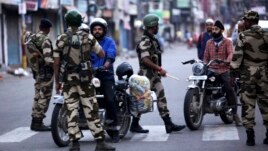05 August, 2019
India's Hindu nationalist government has moved to take away the special status that the territory of Kashmir has held for many years.
Home Minister Amit Shah told parliament Monday that the president had signed an order cancelling Article 370 of the Indian constitution. Article 370 permitted Kashmir to have self-rule in all issues except foreign affairs, defense and communications.

Security personnel question motorists on a street in Jammu on August 5, 2019. (Photo by Rakesh BAKSHI / AFP)
The new law also removes rules that barred Indians from moving to the area, buying land and holding local government jobs.
The law still needs the approval of the Indian Parliament.
Last week, India deployed 10,000 additional troops to Kashmir to maintain security as the announcement neared.
Pakistan's foreign ministry said in a statement that it "strongly condemns" India's actions towards the "internationally recognized disputed territory."
Kashmir is divided between India and Pakistan, but both countries claim the whole territory. It has been the cause of two of the three wars between the countries.
The statement from the Pakistan foreign ministry also said that the government of India does not have the right to change the status of Kashmir. The dispute over the territory was mediated by the United Nations.
"Pakistan will exercise all possible options," it said.
Shah's announcement was also met with large protests from opposition parties in India's parliament. They called the new law "unconstitutional."
The new measures would give the government in New Delhi control of Kashmir.
Since 1989, the territory has suffered a separatist uprising that has killed tens of thousands of people.
More troops were airlifted to the territory after the announcement.
Prime Minister Narendra Modi's Bharatiya Janata Party has long said that Kashmir's special status should end, so that it can join the rest of India. The party's lawmakers called the decision "historic."
But local Kashmiri politicians have warned against the step. They promised to protect the territory's "identity." They fear that opening up Kashmir to people from other parts of India could change the demography of India's only Muslim majority area. Two thirds of Kashmir's population is Muslim.
Hours before the announcement, three Kashmiri leaders were put under house arrest in Srinagar, the capital of Kashmir, including Omar Abdullah. He is the head of the National Conference party in Kashmir. He called the decision "an aggression against people of J&K (Jammu and Kashmir)."
Jammu is another part of Kashmir. The new law will split the area into two federal territories consisting of Jammu and Kashmir and the Buddhist region of Ladakh.
Mehbooba Mufti is the former Chief Minister of Kashmir. She said the government's decision would make India's troops an occupying force. She also said the results would be catastrophic.
"Today marks the darkest day in Indian democracy," she tweeted.
Hours before the announcement, Kashmir was shut down. Internet services stopped, and schools and shops closed.
For the past few days, Indian officials had urged visitors to leave the area. Panic spread, and people bought as much food and gasoline as they could find.
While the Indian people will most likely support the new law, it will probably end up in the federal courts.
Several political experts expressed fear that the new law would increase anger among the separatists. Islamic militants are fighting for either independence or to join the country of Pakistan.
"What cannot be changed is the enmity that is being created between Hindus and Muslims," said Neelanjan Sircar. He is an independent political expert in New Delhi.
He said, "Can we really ever (see) a time where all troops will be pulled out and everyone will get along peacefully? I don't see that today."
I'm Jonathan Evans.
VOA's Anjana Pasricha reported this story. Susan Shand adapted it for VOA Learning English. The editor was Mario Ritter Jr.
______________________________________________________________
Words in This Story
status– adj.the position a country or person holds when compared to others
mediate– v. to work with two sides to get an agreement
option– n. the opportunity to choose between several things
demography– n. changes in human population
catastrophic– adj.terrible
enmity– n. feelings of hatred